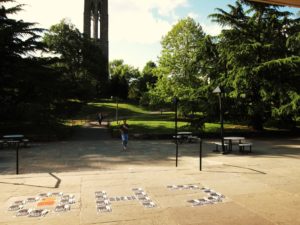
Daniel Cho for The Phoenix
The abrupt annulment of the spring Student Council elections last semester amid a hectic final exam period took Swatties by surprise, leaving many confused on the exact reasons for this decision.This turn of events began with an official appeal made by one of the presidential candidates — Victor Brady ’13 — after the election’s conclusion. The appeal raised two issues; that his opposing candidate — Daniel Cho ’13 — had been soliciting votes and intimidating voters at the polling station and that inadequate time had been provided to the candidates to make their platforms public.In the end, the council adhered to a strict interpretation of Section 1.3.1 of the Constitution, overturning the results of all four races because 14 days had not been allotted to publicize platforms.Secretary Sarah Dwider ’13 elaborated on the council’s decision. “While both complaints were seen as valid, the platform publicizing issue was more all-encompassing and the decision to overturn the election was primarily based on it, although the issue of election interference was also significant,” she said.Much of the subsequent confusion about the reason for the overturn originated from the council’s official email sent out on May 3, which listed the charges of electioneering without mention of the platform publicizing issue.“A candidate engaged in asking a significant portion of students to vote for them at the voting station. The candidate then continued to watch the students vote resulting in intimidation. In accordance with Section 1.6.3 of our Constitution, ‘If SC finds that an election was fraudulent to the extent that the determination of the winner was probably affected, the election shall be voided,’ Student Council has, thus, voided the results of the entire election,” said Co-President Matt Lamb ’12 in the email.
Cho, who won the first election by a rather wide margin of 131 votes, felt the ambiguous charge of electioneering was political.
“While hanging up flyers, and in the presence of another Student Council representative, I asked a couple students if they had voted yet, then told those who were interested about my platform. There are no rules against Election Day campaigning, and I was there for less than half an hour on Election Day. The idea that I was somehow coercing other students came out of left field.”
While Cho questioned the integrity of the entire appeal, stating, “I am a bit skeptical if Mr. Brady would have appealed the elections on constitutional grounds had the election been in his favor,” he noted that he was excited to have continued dialogues with other students. “I am looking forward to sharing my ideas once again about how we can improve Swat life and Student Council’s roles on campus. I am still very hopeful that we can accomplish good things this year.”
The appeal meeting was held on May 3. No official records of the meeting exist because appeal meetings do not require the proceedings to be recorded.
The council found the issue over platform publicizing unambiguous. The complaint stated that candidates were only given 10 days notice to publicize their platforms instead of the two weeks, or 14 days, that Section 1.3.1 of the Constitution requires.
According to a strict reading of the constitution, this violation would invalidate the entire election.
The decision on the issue of election interference, however, was complicated by the weak wording of the StuCo Constitution on the guidelines for campaigns and elections.
“While there is no official rule prohibiting this [practice], many people felt it was a violation of an unwritten rule,” Appointments Chair William Lawrence ’12 said.
Lawrence described the council’s deliberations over the fate of the election as “highly contentious,” with some members advocating a strict reading of the constitution and the overturn of the entire election.
“The rest of StuCo wanted to only re-do the presidential election, to ensure fairness and that people’s votes would not be influenced, but preserve the results of the other three races,” Lawrence said.
Not all of the council members are in accordance with the decision to scrap the election on the basis of the relatively minor infractions raised, with Lawrence being the most vocal.
“I was, and still am, strongly opposed to throwing out the entire election. To invalidate the races based on a small technicality seemed unfair to the students who voted, and the candidates who devoted their time to what turned out to be an irrelevant election,” Lawrence said.
Lawrence also stressed that the council’s purpose is to advocate the interests of the Swarthmore student body and hope that similar quarrels will not limit its mission in the future.
“Students have a lot of legitimate concerns and Student Council should be working with students to have those concerns met by the administration. I hope Student Council can move past this business and work with the entire student body to build power and improve this college for all of us,” Lawrence said.
Despite the controversy on the overturn decision, the council hopes to start over with a clean slate and has urged all of the previous candidates to run again in the emergency elections to be held during the fall semester.
Co-President Gabby Capone ‘14, currently leading the election committee, said “This [election] will be further discussed and planned during Orientation week so that we can hit the ground running, and in our StuCo meetings, which are open to all.”
In response to the disputes over the interpretation of the Constitution, one of the election committee’s main tasks will be to improve the limitations and ambiguities in its wording.
“Prior to the election, Student Council will draft more specific campaign and election guidelines in order to ensure these circumstances do not arise again,” Co-President Matt Lamb ’12 stated.
Dwider further commented on the preparations for the election. “Right now, we’re just making sure we cross the t’s and dot the i’s and have everything in order so that the next elections will run more smoothly.”













